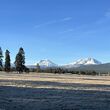Articles written by Alex Baumhardt
Sorted by date Results 1 - 3 of 3
Oregon needs more money to fight big wildfires
The Oregon Department of Forestry needs more and consistent funding to fight wildfires. That much was clear following the 2020 Labor Day fires that burned nearly 850,000 acres of forests and became the state’s most expensive disaster in h... — Updated 2/6/2024 Full story
Old growth to get additional protection under updated plan
America’s oldest trees, most of which are in the West, will get added protection from wildfire and climate change under updated forest plans from the U.S. Forest Service. In announcements over the past week, officials from the Forest S... — Updated 1/2/2024 Full story
The West is losing its glaciers
Glacial melt from climate change is no longer just a problem at the poles. Across the contiguous Western U.S., glaciers are slowly disappearing, according to a new analysis by researchers at... — Updated 11/28/2023 Full story














